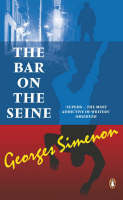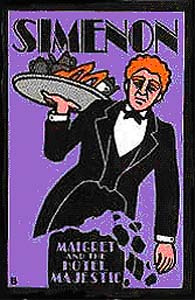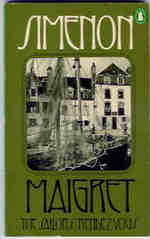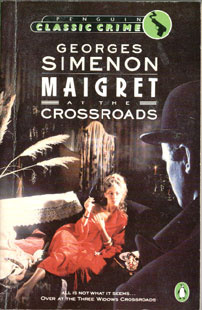Georges Simenon - Monsieur Monde Vanishes
Here you can read online Georges Simenon - Monsieur Monde Vanishes full text of the book (entire story) in english for free. Download pdf and epub, get meaning, cover and reviews about this ebook. year: 2004, publisher: New York Review, genre: Detective and thriller. Description of the work, (preface) as well as reviews are available. Best literature library LitArk.com created for fans of good reading and offers a wide selection of genres:
Romance novel
Science fiction
Adventure
Detective
Science
History
Home and family
Prose
Art
Politics
Computer
Non-fiction
Religion
Business
Children
Humor
Choose a favorite category and find really read worthwhile books. Enjoy immersion in the world of imagination, feel the emotions of the characters or learn something new for yourself, make an fascinating discovery.
- Book:Monsieur Monde Vanishes
- Author:
- Publisher:New York Review
- Genre:
- Year:2004
- Rating:4 / 5
- Favourites:Add to favourites
- Your mark:
- 80
- 1
- 2
- 3
- 4
- 5
Monsieur Monde Vanishes: summary, description and annotation
We offer to read an annotation, description, summary or preface (depends on what the author of the book "Monsieur Monde Vanishes" wrote himself). If you haven't found the necessary information about the book — write in the comments, we will try to find it.
Monsieur Monde Vanishes — read online for free the complete book (whole text) full work
Below is the text of the book, divided by pages. System saving the place of the last page read, allows you to conveniently read the book "Monsieur Monde Vanishes" online for free, without having to search again every time where you left off. Put a bookmark, and you can go to the page where you finished reading at any time.
Font size:
Interval:
Bookmark:

GEORGES SIMENON (19031989) was born in Lige, Belgium. His father was an insurance salesman, easygoing and unambitious; his mother, an unhappy, angry woman whose coldness and disapproval haunted her son. Simenon went to work as a reporter at the age of fifteen and in 1923 moved to Paris, where under various pseudonyms he became a highly successful and prolific author of pulp fiction while leading a dazzling social life in the company of his first wife and such lovers as the American dancer Josephine Baker. (He is said to have broken up with Baker because their affair was a distraction: he had produced a mere twelve novels in the year.) In the early 1930s, Simenon emerged as a writer under his own name, gaining renown for his detective stories featuring Inspector Maigret. He also began to write his psychological novels, or romans dursbooks in which he displays his remarkable talent for capturing the look and mood of a place (whether West Africa, the Soviet Union, New York City, or provincial France) together with an acutely sympathetic awareness of the emotional and spiritual pain underlying the routines of daily life. Simenon remained in France throughout the Second World War, at the end of which he was accused of collaboration with the Germans; though quickly cleared of such charges, he moved to America, where he married his second wife and lived for close to a decade, returning to Europe in 1955. Having written nearly two hundred books under his own name and become the best-selling author in the world, whose stories had served as the inspiration for countless movies and TV shows, Simenon retired as a novelist in 1973, devoting himself instead to dictating memoirs that filled thousands of pages: I consider myself less and less a writer All this is nothing but chatter Since dictating has become a need, so to speak, I will dictate every morning whatever comes into mind I would like to be able to be silent. In 2003 New York Review Books published revised translations of two of Simenons most acclaimed romans durs, Dirty Snow and Three Bedrooms in Manhattan.
LARRY McMURTRY is the author of twenty-four novels, including The Last Picture Show, Terms of Endearment, Lonesome Dove, winner of the 1986 Pulitzer Prize for Fiction, and, most recently, Folly and Glory. His nonfiction works include a biography of Crazy Horse, Walter Benjamin at the Dairy Queen, Paradise, and Sacagaweas Nickname: Essays on the American West (published by New York Review Books). He lives in Archer City, Texas.
MONSIEUR MONDE VANISHES
GEORGES SIMENON
Translated from the French by
JEAN STEWART
Introduction by
LARRY McMURTRY
NEW YORK REVIEW BOOKS

New York
The urge to vanish is common, not merely in life but also in the numerous bookssomewhere between three hundred and four hundredof the super-prolific Belgian-born Georges Simenon, a writer so popular that in Europe his books, whatever their subject or genre, are merely called simenons. Many of these simenonsseventy-six by his biographer Patrick Marnhams countinvolve a detective named Maigret, Simenons contribution to the international gallery of famous detectives: Sherlock Holmes, Hercule Poirot, Nero Wolfe, and the like.
I have read maybe twenty of Simenons four hundred books (written under at least eighteen pseudonyms) and have seen only a sampling of the more than fifty movies and nearly three hundred television adaptations his work has yielded; in my view all Simenon films should star the wonderfully low-rent French actor (an American expatriate, born in Los Angeles) Eddie Constantine. Simenon is a master of the quick stroke, the spare narrative, and from what I have read and seen of his work I am convinced that wanting to vanish, to cut all ties present and past, is one of his major preoccupations.
We might pause to ask ourselves why people want to vanishmany do make the attempt. Teenagers run off because they find home life overwhelming. White-collar criminals run off in hopes of reaching some safe haven with their ill-gotten gain. Stressed-out wives run off; likewise stressed-out husbands, and no wonder. Midlife, particularly, is likely to consist of an accumulation of uninspiring duties, unwanted links, tiring responsibilities. People run off because they need a break.
Where vanishing is concerned absolute success may require suicide. The American poet Weldon Kees vanished, leaving his car by the Golden Gate Bridge. Unlike Monsieur Monde, of Simenons elegant, appealing novel, Weldon Kees did not come back. On the other hand Agatha Christie, Simenons cross-channel co-prolific colleague, vanished for a couple of months, but was found taking tea in Yorkshire and allowed herself to be persuaded to return.
Albert Camuss famous novel The Stranger was published in 1942; Monsieur Monde Vanishes, with which The Stranger shares certain characteristics, came out three years later, in 1945. The Occupation ended, then World War II ended, but you wont learn these facts from Simenon. He is as meticulous as Jane Austen when it comes to excluding world events. No Hitlers, no Napoleons for these two.
Monsieur Norbert Monde, of Simenons story, is a respectable and successful Paris businessman. Does he leave town because of a fight with his not-exactly-affectionate second wife? Non. Does he leave because he has suffered business reverses, or, perhaps, because he has embezzled money? Non, non. Monsieur Monde just leaves, impelled by some inner impulse that the reader is not privy to.
Monsieur Monde seems glad to be vanishing; not ecstatic, exactlyecstatic is not a Simenon dimensionjust glad. But he has only proceeded from Paris to Marseilles before life sets a slight hook in him: a young woman in a hotel room next to his has had a fight with her boyfriend; despairing, she has swallowed a lot of pills. Her name is Julie and she is one of many slightly smudged young women, a step or two off the streets, whom Simenons heroes invariably hook up with: Julie is not a child, though barely an adult; she is neither ugly nor beautiful; she is not exactly a prostitute but is not safely respectable either. Simenon supposedly claimed to have slept with ten thousand womenthe basketball player Wilt Chamberlain claimed the same totalmost of them prostitutes. The seedy back streets of great citiesParis, New Yorkwas the milieu he returned to time after time, and many of his escapees, men who excel at cutting ties, nonetheless often make room in their lives for one of these appealing if vulgar young women, most of them not unlike Julie.
Monsieur Monde saves Julie and the two soon move on to Nice, where Julie hopes to get work in one of the gambling palaces. She and Monsieur Monde eventually make love, though its not wild passion that binds them, but something closer to resignation. Theres not a lot of wild passion in Simenon, at least not in the ones Ive read.
With the soft air of the Riviera to sustain them both, Julie and Monsieur Monde get jobs; the latter becomes, briefly, a gambling-hall employee and assumes an alias, Dsir Clouet. By chance he runs into his first wife, Thrse, now a morphine addict; Monsieur Monde saves Thrse too, though not in the way she would have preferred to be saved. In the Simenon books I know, very little happens between men and women in the way that the women would have preferred it to happen; nor, for that matter, are the men themselves overly pleased.
Monsieur Monde Vanishes reminds one of The Stranger
Font size:
Interval:
Bookmark:
Similar books «Monsieur Monde Vanishes»
Look at similar books to Monsieur Monde Vanishes. We have selected literature similar in name and meaning in the hope of providing readers with more options to find new, interesting, not yet read works.
Discussion, reviews of the book Monsieur Monde Vanishes and just readers' own opinions. Leave your comments, write what you think about the work, its meaning or the main characters. Specify what exactly you liked and what you didn't like, and why you think so.















